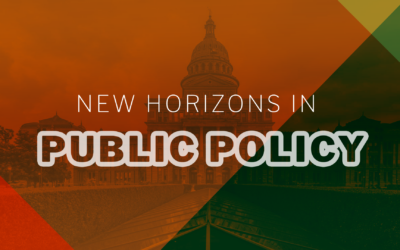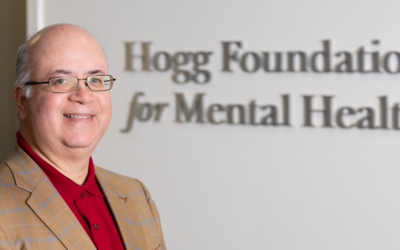
Mental health advocacy in Texas is undergoing significant shifts as new policies reshape the landscape of care and access. Our most recent episode of Into the Fold features a compelling discussion with three local policy experts: Mandi Zapata of the Texas Civil Rights Project, Noah Jones of the Texas Counseling Association, and Maia Volk of Disability Rights Texas. These advocates, all Hogg Policy Fellows, share their perspectives on how policy changes impact mental health care, particularly within schools and marginalized communities.
The Policy Landscape: Challenges and Changes
One pressing concern is the increasing criminalization of youth in schools, particularly regarding policies on vaping. Mandi highlights how punitive approaches disproportionately affect students with mental health needs, creating a school-to-prison pipeline instead of addressing underlying issues.
“We did not pay attention to their mental health COVID,” Mandi notes, emphasizing that disciplinary measures often ignore the broader social and emotional needs of students.
Noah focuses on challenges faced by school counselors, citing two controversial bills that threaten the integrity of mental health care in schools. One allows chaplains to serve as mental health providers, while another removes the requirement that school counselors have prior teaching experience. These changes, he argues, dilute the professional standards necessary to provide effective care to students.
“You want to have mental health care in schools,” says Noah. “But you need to make sure those caregivers are trained on how to deal with certain situations.”
Maia adds that recent funding shifts are exacerbating the crisis. With the expiration of COVID-era Elementary and Secondary School Emergency Relief (ESSER) funds—used by 73 percent of Texas school districts for mental health services—many schools are struggling to sustain their programs. She emphasizes the need for dedicated mental health funding.
“Psychological safety and a positive campus environment are just as important when it comes to school safety,” says Maia.
The Importance of Advocacy
Despite these challenges, Mandi, Noah, and Maia emphasize the power of advocacy in shaping policy. Effective advocacy, they argue, requires a combination of coalition-building, storytelling, and persistence.
Mandi’s lived experience as a formerly incarcerated individual fuels her passion for systemic change. She and her peers founded the Lioness Justice Impacted Women’s Alliance to amplify the voices of women affected by incarceration. Their advocacy contributed to the successful passage of a bill improving medical transportation for incarcerated women—an achievement many had deemed impossible.
Noah stresses the importance of collective action, recalling a recent grassroots effort by the Texas Counseling Association. By mobilizing members to submit public comments, they successfully influenced a rule change ensuring that mental health training in schools follows evidence-based practices.
“Remember the power of your members,” Noah urges.
Maia emphasizes the need for education and empathy in policymaking.
“Lived experience is the most important thing,” Maia says, noting that effective advocacy relies on elevating the voices of those directly impacted.
Mental Health Challenges in Advocacy Work
Advocating for mental health policy is not just about legislative wins—it also takes an emotional toll on those doing the work.
Mental health policy work is demanding, requiring persistence, patience, and an ability to handle setbacks. Advocates often face resistance, political headwinds, and slow-moving legislative processes. Despite these challenges, they continue pushing forward, driven by a belief that change is possible.
Because mental health policy work can lead to burnout, making self-care and support systems crucial. Maia, a social worker, highlights the importance of understanding brain science in managing stress. She applies the same self-regulation techniques she once taught children, including mindful breathing and sensory tools.
“I use those same tools when I’m about to testify or walk into an important meeting,” says Maia.
Noah emphasizes the importance of persistence and underscores the necessity of maintaining hope and perspective even when progress seems slow.
“The long arc of Texas is not yet over. There is still work to be done,” he says. “While legislative wins can take years, even small victories—such as changing one policymaker’s mind—are steps in the right direction.”
Mandi draws on her lived experience to emphasize the power of community. She recounts an emotional moment when formerly incarcerated women testified at a legislative hearing, sharing their struggles.
“As each one of them walked out, our girls got together and made sure to surround them with love,” she says.
This sense of solidarity helps advocates sustain their work despite the emotional toll.
Noah, Mandi, and Maia also touch on how advocates navigate resistance from policymakers. Noah acknowledges that political opposition can feel personal, but he stresses the importance of resilience.
“There is always a tomorrow with this stuff,” he says. “One hundred percent.”
Staying Engaged
Mandi, Noah, and Maia urge listeners to stay engaged in advocacy efforts, seek out resources, and build community connections.
“If you feel like politics is hopeless in Texas, please do not give up,” says Noah. “There are a lot of good people out there who agree with you.”
Maia reinforces the importance of amplifying the voices of those with lived experiences.
“People with disabilities experience mental health challenges at higher rates and face more barriers to accessing services,” she says.
Mandi emphasizes that real change requires collective effort.
“If you want to create change, you have to be part of the change that you want to see,” says Mandi.
This means engaging in conversations, educating oneself about policies, and participating in local and state advocacy efforts.
Looking Ahead
Mental health advocacy is a long-term commitment, requiring resilience, collaboration, and a belief in the power of change. The work of advocates like Mandi, Noah, and Maia serves as a reminder that every conversation, every legislative hearing, and every small victory contributes to a more just and supportive mental health system.
As Texas continues to grapple with systemic changes, these three mental health advocates remain steadfast in their mission: ensuring that policies reflect the needs and dignity of the communities they serve. Through collaboration, persistence, and bold advocacy, meaningful progress is possible.
For those interested in supporting these efforts, resources can be found at Texas Civil Rights Project, Texas Counseling Association, and Disability Rights Texas.
Hogg Foundation to Conclude Successful Policy Initiatives, Leaving a 16-Year Legacy of Legislative and Policy Impact
The Hogg Foundation for Mental Health will conclude its Policy Academy (HPA), Policy Fellow Grants (PFG), and Peer Policy Fellow Grants (PPF) initiatives in 2026, leaving a lasting legacy of legislative and policy impact.
$2 Million Awarded to Train Mental Health Policy Fellows in Texas
The Hogg Foundation for Mental Health is excited to award $2 million in grant funding over two years for eleven nonprofit advocacy organizations to hire in-house policy fellows.
Policy Academy and Policy Fellows: Learning from the Past to Serve the Future
A statement by our executive director, Dr. Octavio N. Martinez, Jr., on an important change to the Hogg Policy Academy and Fellows initiative.
Hogg Policy Academy and Policy Fellows to Focus on Child, Youth, and Family Mental Health and Well-being in Next Cohort
The 2024-25 cohort of the Hogg Foundation for Mental Health Policy Academy and Policy Fellows initiative will focus on supporting child, youth, and family mental health and well-being.
$1.4 Million Awarded to Train Mental Health Policy Fellows in Texas
Hogg awards Nonprofit advocacy groups $1.4 million in grants over two years to hire in-house policy fellows.
$1.2 Million Awarded to Train Mental Health Policy Fellows in Texas
The foundation is excited to announce that 10 nonprofit advocacy groups received grants over 2 years to hire in-house policy fellows.




